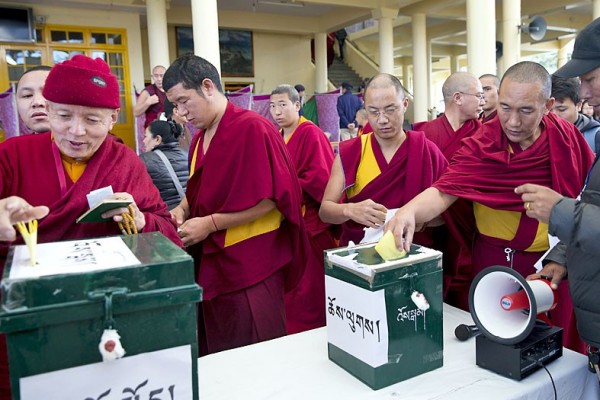《TAIPEI TIMES 焦點》 Exiled Tibetans elect leader as Dalai Lama steps back

Exiled Tibetan monks cast their vote to elect the next prime minister and parliamentarians in Dharamsala, India, Sunday, March 20, 2016. Tens of thousands of Tibetan exiles are voting around the world Sunday to elect a new prime minister and parliament for a second time since the Dalai Lama stepped down as head of the government in 2011 to focus on his role as a spiritual leader. Photo: AP
/ AFP, DHARAMSALA, India
Tens of thousands of exiled Tibetans yesterday voted for a new leader tasked with sustaining their struggle for greater autonomy in the Chinese-ruled nation as the Dalai Lama retreats from the political front line.
While Tibetans from across the world were geared up to vote, those in the picturesque Indian hill town of Dharamsala, where the Dalai Lama lives, started lining up at booths at 9am to elect the next leader of the government-in-exile.
One by one, hundreds of Tibetans, including monks and nuns, scribbled the names of their favorite candidates on pieces of paper and slipped them into green ballot boxes as polls were set to close at about 5pm.
The post of prime minister-in-exile was a low-profile role before the 80-year-old Tibetan spiritual leader devolved power in an attempt to lessen his own totemic status and foster a democratic setup to keep Tibet’s freedom movement alive after his death.
While many felt voting could help their campaign against Chinese rule over their Himalayan homeland, several were skeptical given the government-in-exile’s lack of effective power.
“I am not sure whether the democratic system can help in Tibet’s freedom struggle, but its values and rights can definitely ... bring more awareness on the Tibetan cause,” said Rikten, a 28-year-old teacher.
The Dalai Lama announced his decision in March 2011, just days before the election of the Tibetan government-in-exile Prime Minister Lobsang Sangay, 48, who was standing again yesterday.
The Harvard-educated former academic is regarded as the frontrunner, having already beaten off three of the four other candidates in a first round of voting in October last year.
Both he and his one remaining opponent, Penpa Tsering, 49, favor the “middle way” approach of the Dalai Lama that advocates seeking greater autonomy for Tibet peacefully.
In all, 88,000 Tibetans in 13 nations from Australia to the US were registered to cast ballots for a prime minister and the 44-member parliament-in-exile.
Many voters, like Sangay, have lived all their lives in exile and never visited Tibet.
One of the eliminated candidates, Lukar Jam Atsok, spent time as a political prisoner in China and had threatened to make waves with his more aggressive policy of advocating complete independence.
On policy, there is relatively little to choose between Sangay and his remaining opponent, and opinions on the streets of Dharamsala were mixed in the run-up to yesterday’s vote. Many said they would vote for Sangay. However, some who voted for him in 2011 said they had been disappointed by his performance in office.
“I will vote for Penpa Tsering, who has decades of experience serving in the Tibetan government-in-exile and in the Tibetan community. He will have more substance,” said Lhadon, a 55-year-old woman.
Both Sangay and Tsering voted, while Atsok cast an “empty vote” to express dissatisfaction over the election commission’s move to bar his candidacy.
The results of the election are expected on April 27.
Tsering was born in India and has served in the Tibetan parliament-in-exile based in Dharamsala for 10 years, where he is currently the speaker.
Whoever prevails can expect to remain in the shadow of the Dalai Lama, a Nobel Peace Prize laureate, who remains the most potent rallying point for Tibetans, both in exile and in their homeland.
The Himalayan hill town has been home to him and thousands of Tibetan refugees since he fled Tibet in 1959 after a failed uprising against Chinese rule.
Despite the Dalai Lama’s status, many exiles said it was important to vote.
“The election is really important. It is a basic right of a citizen to vote and we take this opportunity as a blessing,” said Sonam, a 22-year-old Tibetan student in Nepal.
She said she hopes the Nepal government would allow voting to go ahead after authorities confiscated ballot boxes in 2011, apparently under pressure from China.
China has widely been seen as waiting for the Dalai Lama’s death, believing that the movement for Tibetan rights would not survive without its charismatic and world-famous leader.
The globe-trotting Buddhist monk raised concern among his millions of followers last year when he scrapped a tour of the US for health reasons.
Asked about the election, Chinese Ministry of Foreign Affairs spokesman Lu Kang (陸慷) said Beijing had never recognized the government-in-exile and hopes other nations “will not provide any stage for Tibetan separatist activities.”
新聞來源:TAIPEI TIMES




















